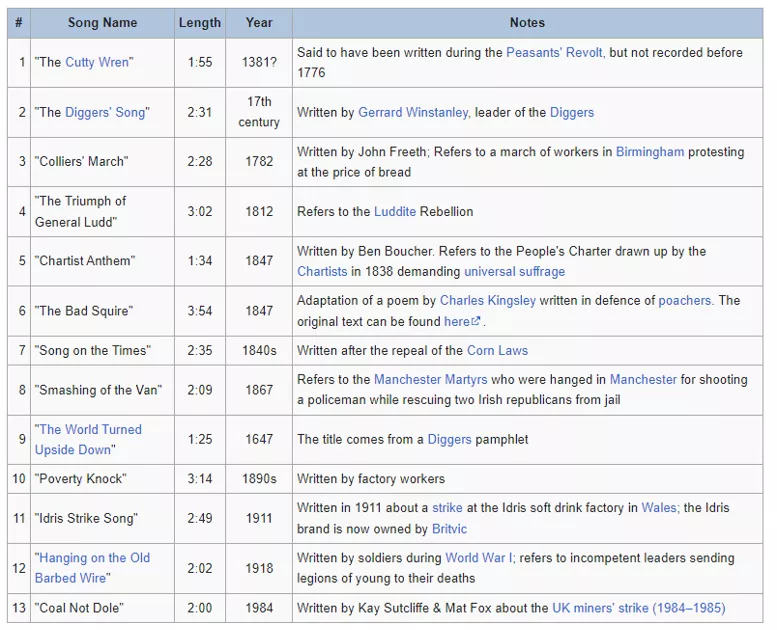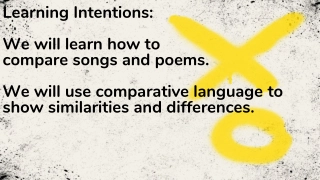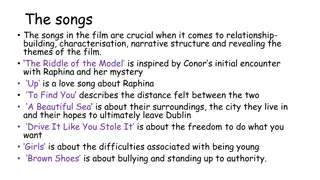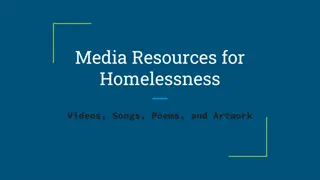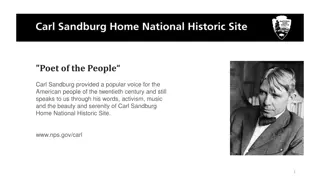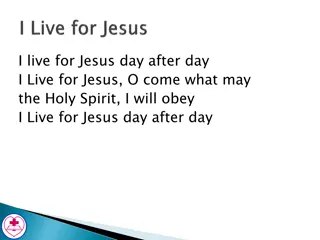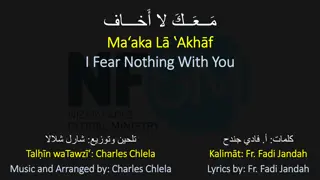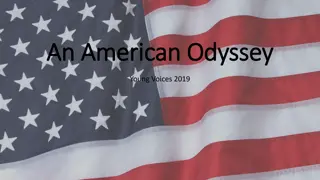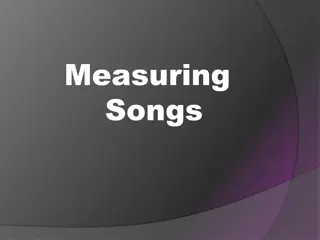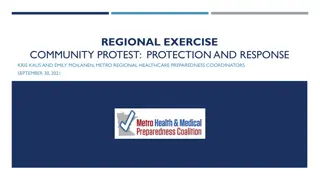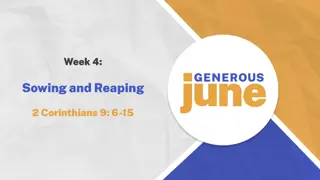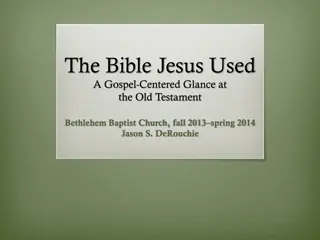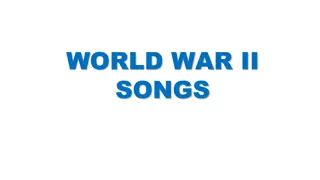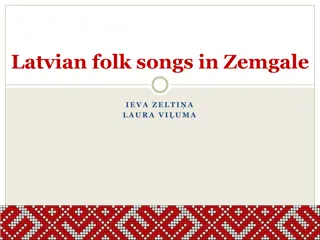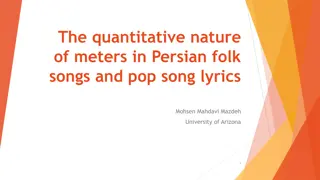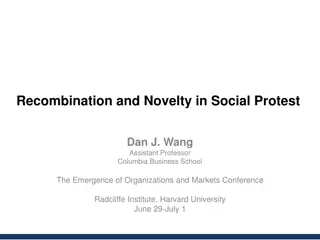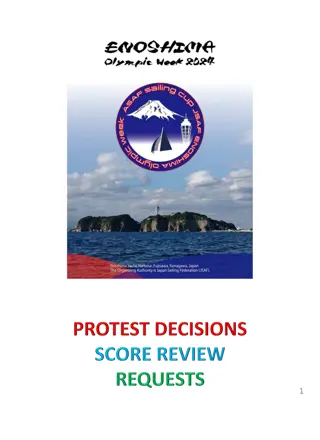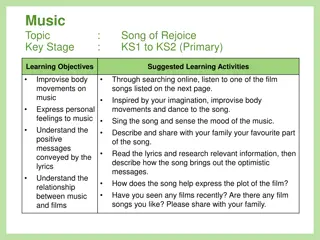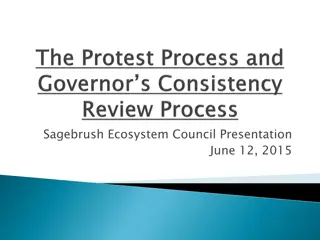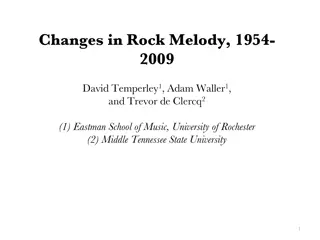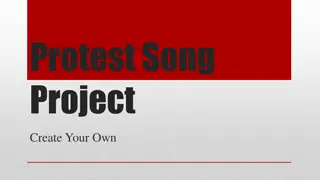Songs and Protest
Explore the deep-rooted connection between songs and protest throughout English history. From the traditional rebel song "The Cutty Wren" depicting the Peasants' Revolt in 1381 to the revolutionary actions of "The Diggers" in 1649, these songs have served as powerful tools for conveying dissent, challenging authority, and inspiring unity within movements. Discover the historical significance and the empowering role of music in resistance and rebellion.
Download Presentation

Please find below an Image/Link to download the presentation.
The content on the website is provided AS IS for your information and personal use only. It may not be sold, licensed, or shared on other websites without obtaining consent from the author.If you encounter any issues during the download, it is possible that the publisher has removed the file from their server.
You are allowed to download the files provided on this website for personal or commercial use, subject to the condition that they are used lawfully. All files are the property of their respective owners.
The content on the website is provided AS IS for your information and personal use only. It may not be sold, licensed, or shared on other websites without obtaining consent from the author.
E N D
Presentation Transcript
Songs and Protest Songs and Protest History and examples Tom Cook, community composer Songs have been a part of protest and rebellion throughout history. There is something unifying and empowering that songs can give to a movement. Songs have long been used as a way to pass on ideas, to pass on history and to challenge ideals. They can make a group of individuals feel like one large voice, this is part of the beauty of songs and protest. DO YOU SING? WHAT DOES IT FEEL LIKE TO SING TOGETHER? DOES IT MAKE YOU FEEL STRONG?
English Songs of Rebellion English Songs of Rebellion This list is of English rebellion songs from 1381 to 1984, this is just a few. Folk songs are full of tales recalling battles, civil movements and uprisings. Plus sad tales of loss. Bards, poets and musicians used to carry history both old new in song. They could also spread dissent and rebellion. The Cutty Wren is a rebel song. It sings about killing the Wren, cutty is a northern word for little and the Wren is called the 'King' of the birds. WHAT COULD IT MEAN? WHY WOULD IT NOT BE WRITTEN DOWN??
The Cutty Wren The Cutty Wren The Peasants Revolt. The Peasants Revolt. Oh where are you going said Milder to Moulder Oh we may not tell you said Festel to Fose We're off to the woods said John the Red Nose We're off to the woods said John the Red Nose And what will you do there said Milder to Moulder We'll shoot the Cutty wren said John the Red Nose And how will you shoot us said Milder to Moulder With bows and with arrows said John the Red Nose Oh that will not do said Milder to Moulder Oh what will you do then said Festel to Fose Great guns and great cannon said John the Red Nose And how will you fetch her said Milder to Moulder Oh we may not tell you said Festel to Fose On four strong men's shoulders said John the Red Nose Ah that will not do said Milder to Moulder Oh what will do then said Festel to Fose Great carts and great wagons said John the Red Nose The Peasants Revolt in 1381. Wat Tyler led a rebellion against the poll tax, with peasants and labourers and well-to-do artisans. They marched upon London took the palace of the Kings uncle and negotiated with the government for the end of serfdom and forced labour. Lyrics to The Cutty Wren. Traditional n.d. He was killed meeting the King the next day by the mayor of London, but the King promised reforms to stop the uprising. He forgot his promises.
The Diggers The Diggers - - 1649 1649 In 1066 after the invasion by William the 1st, England's land was split between 180 barons. People who lived and worked on that land had to pay rent and pay taxes on what they produced. The people were left some common land but this was usually wasteland and unsuitable for growing food. In 1649 on St Georges Hill, Weybridge, Surrey, the diggers began turning the hill from rough land into farmland and gave food away from their first harvest. The landowners threatened the army and took them to court where the Diggers were not allowed to speak. The Diggers believed no one should own the land and they began levelling rough land for people to grow food for free.
Folksong and Billy Bragg retelling In 1649 To St. George's Hill A ragged band they called the Diggers Came to show the people's will They defied the landlords, They defied the laws They were the dispossessed reclaiming what was theirs We come in peace they said, To dig and sow We come to work the lands in common And to make the waste grounds grow This earth divided, We will make whole So it will be a common treasury for all The sin of property We do disdain No man has any right to buy and sell The earth for private gain By theft and murder They took the land Now everywhere the walls Spring up at their command You noble diggers all stand up now, stand up now You noble diggers all stand up now The wasteland to maintain sin cavaliers by name Your digging does maintain and persons all defame Stand up now, stand up now Your houses they pull down stand up now, stand up now Your houses they pull down, stand up now Your houses they pull down to fright your men in town But the gentry must come down and the poor shall wear the crown Stand up now diggers all Stand up now From The World Turned Upside Down by Leon Rosselson. 1975. Recorded by Billy Bragg. From The Diggers' Song, 1649 WHICH ONE DO YOU LIKE ? IS IT A GOOD STORY TO TELL ?
Greenham Common Greenham Common Women s Peace Camp Camp Women s Peace In 1981 a group of 36 women the 'Women for Life on Earth' began a protest to stop nuclear weapons being placed on British soil. It was outside RAF Greenham Common. They chained themselves to the fences in peaceful protest. After the march they realised they needed to stay to stop the weapons being brought into the base. 30,000 women joined them to blockade the base. In 1983 50,000 women encircled the base, in 1991 the missiles left the base for good. The women gathered a lot of press coverage but a lot of it was horrible. But they believed in themselves.
Chant down Greenham Chant down Greenham Thirty five women, campers for peace Breaking the law So there'll be no more war... We won't live in fear We'll always be here 'Till the skies are clear Chant down Greenham. We don't want your laws We don't like your cause We wont fight your wars Chant down Greenham From Chant Down Greenham, 1983. Words by Alana O'Kelly with additional lyrics by women of Greenham. Thirty five thousand women for peace Embracing the base So there'll be no more war The women would lie in the roads to block lorries and police they would use their bodies to stop people entering. Embracing the base and decorating the fences with beauty. We don't want your Cruise We have life to lose It's not too late to choose Chant down Greenham It became a powerful movement asking for a public debate about nuclear weapons coming to the UK. Women working together was very different at the time. More and more women reflecting the base Stating our case So there'll be no more war
Bob Marley Bob Marley Get Up Stand Up Get Up Stand Up Get Up Stand Up was written and released in 1973 by Bob Marley and Peter Tosh. The band were touring Haiti and the poverty of the locals deeply upset them. He was a Jamaican singer and a Rastafarian who supported the struggles of Africans and people who had been sold and raised through the slave trade. The song became a global anthem for down trodden people.
Get Up Stand Up.. Get Up Stand Up.. Most people think, Great God will come from the sky Take away everything and make everybody feel high But if you know what life is worth You will look for yours on earth And now you see the light I want you to stand up for your right. Yeah... Get up, stand up, stand up for your right Get up, stand up, stand up for your right Get up, stand up, stand up for your right Get up, stand up, don't give up the fight Preacher man, don't tell me heaven is under the earth I know you don't know what life is really worth It's not all that glitters is gold and Half the story has never been told So now you see the light You stand up for your rights From Get up, Stand Up Lyrics by Bob Marley, Peter Tosh. Recorded by Bob Marley and the Wailers. 1975
What would you Stand Up For??? What would you Stand Up For??? We live in a democracy, where we chose who leads us and who makes the laws. But things can become forgotten and people can become down trodden. What would you stand up for? What needs to be stood up for in your area? What needs to change in the world? How would you make the world a kinder place?
Reference Reference list list Slide 2: English Rebel Songs 1381 1984 Wikipedia, The Free Encyclopedia. Last revised: 27 Apr 2023. https://en.wikipedia.org/w/index.php?title=English_Rebel_Songs_1381%E2%80%931984&oldid=1152040678 Slide 3: Lyrics from The Cutty Wren Traditional. N.d. Slide 3: Image - Peasant's Revolt 1381 on British Library's Timelines: sources from history https://www.bl.uk/learning/timeline/large132518.html From a manuscript copy of the Chronicles of Jean Froissart, c.1483 at British Library, Royal MS 18 E I f.175. Slide 4: Image - Jean-Fran ois Millet, The Diggers, 1855 56, Etching with drypoint on tan laid paper. Clark Art Institute, Acquired by the Clark, 2014.20.2 https://www.clarkart.edu/ArtPiece/Detail/The- Diggers-(1) Slide 5: The Diggers' Song, 1649. Attributed to Gerrard Winstanley. Slide 5: The World Turned Upside Down, 1975. Leon Rosselson. https://leonrosselson.co.uk/ Slide 6: Image of printed song sheet of Chant Down Greenham. LSE Library, Greenham Common Collection, 5GCC/B Slide 7: Chant Down Greenham, 1981. Words by Alana O Kelly, additional lyrics by the women of Greenham. https://www.theguardian.com/uk/2007/may/17/greenham.yourgreenham4 Slide 8: Image Bob Marley performing at Dalymount Park, on 6 July 1980. By Eddie Mallin https://commons.wikimedia.org/wiki/File:Bob-Marley_3.jpg Slide 9: Get Up, Stand Up, 1973. Lyrics by Bob Marley, Peter Tosh. Recorded by Bob Marley and the Wailers.
Songs of Protest workshop Developed by Tom Cook, composer and musician https://www.tomcooksound.co.uk/ for LSE Library project, Change for People by People, for LSE Festival 2023 Shared under Creative Commons licence CC-BY-NC





